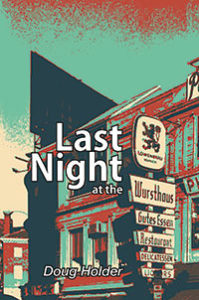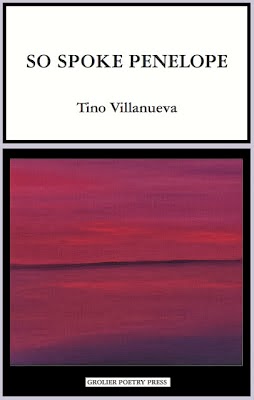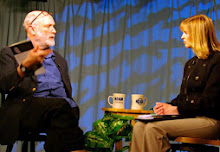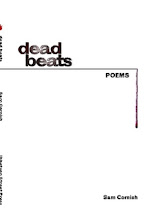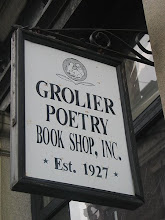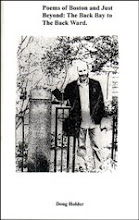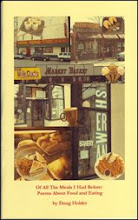 |
| Lobby--Chelsea Hotel- In Better Days |
I have often called my hometown Somerville, Mass., a burg just outside Boston and Cambridge, the "Paris of New England." And what I mean by this is not that it remotely resembles Paris physically, but that it harbors that same creative energy and that molten core of poets, writers, and artists, all in close proximity. And of course with encroaching gentrification of our town--the new developers, and the desire to attract the upscale folks--rents rise, and the artists will look to cheaper environs that are more inviting to a bohemian sensibility. This may or may not happen here in Somerville, but if we look at history, we will see that it is more or less inevitable. And in some ways the artistic community of the Chelsea Hotel and its fate reminds me of my hometown.
The Chelsea Hotel in New York City has always been a source of fascination for me. This Victorian-era building, in the Chelsea section of New York City has housed some of the great names of music, literature and the arts since 1884. There was a great cross- fertilization going on here, musicians and poets and painters all influenced each other. Folks like the author Thomas Wolfe, composer Virgil Thomson, playwright Arthur Miller, rocker Patti Smith, Bob Dylan, poet Dylan Thomas, all have walked the dark, melancholy halls that were once peppered with artwork by many famous and not so famous denizens over the many decades.
The hotel is now a shell of its former self. With the gentrification of New York City, and the ousting of the benevolent Bard family who nurtured and protected the many artists who lived here over the years, the hotel is in rapid decline. Ed Hamilton, the author of "The Legends of the Chelsea Hotel" told me in a recent interview that many of the residents have been evicted, the artwork that graced the lobby and halls has been removed to places unknown, and many of the rooms in the hotel have been gutted. History is second to the bottom line.
Recently I had the pleasure to interview Sherill Tippins, author of the book: "Inside the Dream Palace..." The book is a comprehensive history of the hotel and a record of its influence with the arts in New York City and far beyond. The days of rooming houses and affordable housing in our major cities is a distant dream in our collective past. The artists who came to the Chelsea and the vicinity and other gone-to-seed backwaters in many other cities, often revitalized the areas and then ironically they were forced to move on. The Chelsea may well become another boutique hotel surrounded by trendy Thai restaurants, and the prerequisite Starbucks--but I think its legacy will live on because of all the creative tendrils it spread across New York, the country and the world.
Doug Holder: Sherill--you wrote a previous history about the communal Brooklyn home that poets and authors like W.H. Auden, Richard Wright, Carson McCullers and others shared. What is it about this shared space among creative people that attracts you?
Sherill Tippins: I’m interested in looking at artists and their work in the context of their environment – the relationships, working conditions, and activities that affect their work in all kinds of ways. I find it so helpful in terms of understanding, say, Carson McCullers’ The Member of the Wedding, to know that as she began working on the book she was eating breakfast each morning with W. H. Auden, who informed her that she needed to work on developing her intellectual side (as opposed to her intuition), and whose love, Chester Kallman, had as a child actually experienced the central event that McCullers’ protagonist, Frankie, undergoes. Likewise, I gained a new outlook on Arthur Miller’s play After the Fall, knowing that he wrote it while irritated by what he considered the irresponsible moral relativity of his pop-artist neighbors at the Chelsea Hotel.
I’m also fascinated by the delicate dynamics of these kinds of group creative life – that fact that even a slight shift in the balance between structure and spontaneity can poison the atmosphere so that the work fails to satisfy or the group disbands. What are the specific requirements for creative cohabitation? How can privacy be protected while also leaving room for others’ creative input? Who should do the housework? Should the household be run on a democratic or autocratic basis? How high can the rent be before earning it takes up too much of each resident’s time? These nuts-and-bolts issues are not only interesting as practical experiments from which others can benefit, but they can make for high comedy which makes learning about them enjoyable.
DH: Have you ever lived in an environment -- a bohemian retreat--like the Hotel Chelsea?
ST: Like many of us, I lived in a group house while in college, where I learned how possessive some people can be about their groceries, how important it is to specify who does which chores, how creatively stimulating it can be to stay up until the early morning hours discussing books and playing music together, and so on. Since college, though, I’ve lived a traditional life as part of nuclear family. Documenting bohemian retreats has become a secret fantasy life for me – my real life may be predictable and even dull at times, but in my head I’m dining with Virgil Thomson at the Chelsea or chasing fire engines through the streets of Brooklyn with Gypsy Rose Lee.
DH: A lot of the artists in the Chelsea lived under the benevolent hand of Stanley Bard--whose family owned the building for years. He in essence subsidized many artists--did you ever feel that there was a sense of entitlement among the residents there--that they should receive special treatment because they were "artists?"
ST: Stanley Bard, and his father David Bard before him, served the residents of the Chelsea with such care and respect that, naturally, they tended to believe over time that they deserved that respect. (It helped, too, that a constant stream of tourists passing through the Chelsea were even more awed by the artists’ presence.) I don’t believe, however, that the artists felt entitled to “special” treatment if that means better treatment than non-artists should receive. What they felt grateful for, at the Chelsea, was the Bards’ understanding that as artists they required had certain needs (privacy, tolerance, connection) and lived under certain conditions (erratic income, erratic hours) that differed from others living in the mainstream. Stanley Bard might allow a filmmaker to go for months or years without paying rent, for example, but he did expect to be repaid eventually – because he understood that a director’s income may be enormous one year and completely nil the next. Any artist knows how difficult it is to manage this fact of life in a society that expects bills to be paid regularly each month. Naturally, once the Chelsea residents had found partial relief from this hardship they didn’t want to give it up – so I’d say their response to losing it was more a case of grief or even panic than a sense of entitlement.
DH: In your research did you find any similar hotels, etc.. like the Chelsea.. that existed in this country?
ST: As far as I have been able to discern, the Chelsea Hotel is the largest and longest-live artists’ community in the world – and in history, in fact, it would seem. There are other bohemian hotels in the world, of course – such as the former Chateau Marmont in Los Angeles before it got its makeover. And there were other Fourier-influenced cooperatives in the United States – in Boston, for instance, not to mention the earlier Brook Farm and other rural communities. But I know of no other hotel that was intentionally designed as a creative community and that continued to function as one year after year. If one ever did exist, I would love to know about it!
DH: Why do you think Europe is much more receptive to these type of living situations?
ST: The idea of creative community is an integral part of Europe’s social history, and the idea got a huge boost with the advent of the nineteenth-century utopian philosophers. Philip Gengembre Hubert, the Chelsea’s creator and himself a Frenchman who came directly out of this proto-socialist climate and helped transfer its ideas to New York, wrote that Europeans were more comfortable with a communal, economically-mixed climate because they could rely on a rigid social structure to define their social status. Americans, on the other hand, lived in a supposedly classless society where money was the only measure by which they could define their social position. Maintaining one’s social status in America therefore almost requires one to set oneself apart from others of lower economic standing, hoard one’s financial assets, and focus on individual advancement rather than achieving synergy as a group.
DH: There were many eras to the Chelsea--which one do you think cemented its reputation, as an outpost of bohemia and the avant-garde?
ST: It was an outpost of bohemia and the avant-garde from the very beginning, as evidenced by the novelist William Dean Howells’ portrait of it in his 1893 novel The Coast ofBohemia. The American landscape artists who first occupied the Chelsea’s top-floor lofts were as poor, free-living, and artistically adventurous as the artists who live there now. Trying to pinpoint the moment that the building’s bohemian reputation for bohemianism cemented is exactly like trying to pinpoint the moment at which cement hardens – but I guess I would say that by the Depression era the hotel’s reputation was widely known. By this time, for instance, Thomas Wolfe’s editor Maxwell Perkins knew enough to send the author to the Chelsea when Wolfe needed an inexpensive, private, tolerant environment. There, Wolfe found a welcoming community of iconic but impoverished artists and writers, including Edgar Lee Masters and John Sloan (not to mention the slightly-less-impoverished Virgil Thomson). The W.P.A. subsidies greatly enhanced this atmosphere, allowing the residents to worry less about the rent and more about where art was going in America. The richness and excitement of this period carried forward into the 1950s and 1960s – which wouldn’t have been the same without the underlying layer created by the W.P.A. artists.
DH: Residents like the musicologist Harry Smith, Arthur C. Clarke believed that art can change the world. And they tried to do it from their rooms in the Chelsea. Now--looking at the Chelsea --it is a gutted shell of its former self. Is the dream dead? Do you see other bohemian enclaves coming around? Or is it just college graduates posturing in Williamsburg until they get real jobs?
ST: I’m afraid I do feel, personally, that that particular dream is dead for the time being – at least in New York. As I implied in my treatment of Harry Smith’s experience, I feel that in the battle between the bohemian vision of creative community and the capitalist ideals for a market-based society, capitalism won. Commodification kills truth in art; a high cost of living kills artistic productivity. However, there will always be artists and bohemians (just as there will also always be posturers). As Patti Smith herself suggested in a recent interview, the place to find creative communities is now more likely to be in smaller towns near big cities – say, in New Paltz, New York, now nicknamed “the new Brooklyn,” or in failed cities such as Detroit, where the most important element for creative life – a low cost of living – and the second-most-important one – stimulating neighbors -- still exist.
As for the Chelsea, I’m interested in following the current owner’s stated desire to recreate an “artistic climate” at the hotel. Can it be forced into existence, with free rooms for visiting artists, exhibition and performance space downstairs, and expensive rooms to subsidize cheaper ones? One would tend to say no, but on the other hand the original Chelsea was itself an artificial construct. It’s unlikely, but still remotely possible in my opinion, that the Chelsea will reassert its traditional purpose despite the hostile climate in the city surrounding it. And who knows – as New York mayors come and go and the economy continues on its erratic path, this city may hit the skids once again, allowing the bohemians to come rushing in to inhabit the places no one else wants, “like cockroaches,” as the artist and Chelsea Hotel denizen John Sloan once memorably said.











